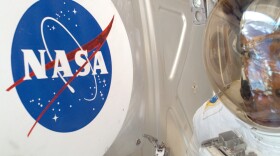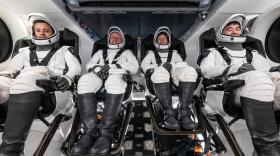-
The crew of Artemis II is on the latest cover of TIME Magazine. In the issue, editor at large Jeffrey Kluger chronicles the mission. Plus, a new spacecraft is taking a closer look at exoplanets and their atmospheres.
-
A number of issues uncovered during a practice run of the launch prompted the move of the mission to no earlier than March 6.
-
Blue Origin, owned by billionaire Jeff Bezos, says it's stopping human spaceflights for at least two years. The move will allow it to "shift resources" to the company's lunar landing capabilities.
-
NASA is moving the fueling test of its SLS rocket to Monday as frigid temps move into Florida’s Space Coast this weekend
-
The second Artemis mission is preparing for launch. The Space Launch Systems rocket is now on the launch pad with the Orion spacecraft, waiting to take a crew of four on a flyby around the moon. Plus, for Canada, this will be the first time a one of their astronauts will flyby around the moon.
-
The Wet Dress Rehearsal is a critical test of the fueling and countdown of NASA’s SLS rocket, which could launch a crew of four as early as Feb. 6.
-
NASA rolled out its Orion spacecraft and SLS rocket, preparing to launch the second Artemis mission. Plus, scientists are studying microscopic organisms called Tardigrades to see how resilient they are when it comes to extreme environments, like space.
-
The SLS rocket arrived at its launch pad Saturday. Teams are working toward a launch as early as Feb. 6.
-
Four people from NASA's Crew-11 mission splashed down off San Diego, successfully completing five months aboard the International Space Station. The trip was cut short due to a medical issue.
-
Congress is moving forward with an appropriation that would only cut about 1% of NASA’s current budget. Plus, a look at a mission that will search for signs of life on distant planets.
-
NASA is returning the crew of four early due to a medical issue with one of the astronauts. It’s the first time a NASA mission has been cut short for health reasons.
-
A medical concern involving one of the crew members cancelled a planned spacewalk Thursday. Now NASA says the issue could cut the entire mission short.
Play Live Radio
Next Up:
0:00
0:00
Available On Air Stations











